I am generating my Annotated Code Classes with hibernate and eclipse JBoss plugin, For the One to Many & Many to Many Relationships etc, the code generated used Set type for collections and generate many to many as one to many relation.
Project:
import java.util.HashSet;
import java.util.Set;
import javax.persistence.Column;
import javax.persistence.Entity;
import javax.persistence.FetchType;
import javax.persistence.Id;
import javax.persistence.JoinColumn;
import javax.persistence.ManyToOne;
import javax.persistence.OneToMany;
import javax.persistence.Table;
/**
* Project generated by hbm2java
*/
@Entity
@Table(name = "project", schema = "public")
public class Project implements java.io.Serializable
{
private int projectId;
private Type type;
private Customer customer;
private String projectName;
private String description;
private Double totalContractAmount;
private Set projectConstructionMaterials = new HashSet( 0 );
public Project()
{
}
public Project(int projectId)
{
this.projectId = projectId;
}
public Project(int projectId, Type type, Customer customer, String projectName, String description,
Double totalContractAmount,
Set projectConstructionMaterials)
{
this.projectId = projectId;
this.type = type;
this.customer = customer;
this.projectName = projectName;
this.description = description;
this.totalContractAmount = totalContractAmount;
this.projectConstructionMaterials = projectConstructionMaterials;
}
@Id
@Column(name = "project_id", unique = true, nullable = false)
public int getProjectId()
{
return this.projectId;
}
public void setProjectId(int projectId)
{
this.projectId = projectId;
}
@ManyToOne(fetch = FetchType.LAZY)
@JoinColumn(name = "type_id")
public Type getType()
{
return this.type;
}
public void setType(Type type)
{
this.type = type;
}
@ManyToOne(fetch = FetchType.LAZY)
@JoinColumn(name = "customer_id")
public Customer getCustomer()
{
return this.customer;
}
public void setCustomer(Customer customer)
{
this.customer = customer;
}
@Column(name = "project_name")
public String getProjectName()
{
return this.projectName;
}
public void setProjectName(String projectName)
{
this.projectName = projectName;
}
@Column(name = "description", length = 500)
public String getDescription()
{
return this.description;
}
public void setDescription(String description)
{
this.description = description;
}
@OneToMany(fetch = FetchType.LAZY, mappedBy = "project") //it should be many to many annotation
public Set getProjectConstructionMaterials()
{
return this.projectConstructionMaterials;
}
public void setProjectConstructionMaterials(Set projectConstructionMaterials)
{
this.projectConstructionMaterials = projectConstructionMaterials;
}
}
ProjectConstructionMaterial
import javax.persistence.Column;
import javax.persistence.Entity;
import javax.persistence.FetchType;
import javax.persistence.Id;
import javax.persistence.JoinColumn;
import javax.persistence.ManyToOne;
import javax.persistence.Table;
/**
* ProjectConstructionMaterial generated by hbm2java
*/
@Entity
@Table(name = "project_construction_material", schema = "public")
public class ProjectConstructionMaterial implements java.io.Serializable
{
private int projectConstructionMaterialId;
private ConstructionMaterialInventory constructionMaterialInventory;
private Project project;
private String description;
private String quantityArrived;
private String quantityConsumed;
public ProjectConstructionMaterial()
{
}
public ProjectConstructionMaterial(int projectConstructionMaterialId)
{
this.projectConstructionMaterialId = projectConstructionMaterialId;
}
public ProjectConstructionMaterial(int projectConstructionMaterialId,
ConstructionMaterialInventory constructionMaterialInventory, Project project, String description,
String quantityArrived, String quantityConsumed)
{
this.projectConstructionMaterialId = projectConstructionMaterialId;
this.constructionMaterialInventory = constructionMaterialInventory;
this.project = project;
this.description = description;
this.quantityArrived = quantityArrived;
this.quantityConsumed = quantityConsumed;
}
@Id
@Column(name = "project_construction_material_id", unique = true, nullable = false)
public int getProjectConstructionMaterialId()
{
return this.projectConstructionMaterialId;
}
public void setProjectConstructionMaterialId(int projectConstructionMaterialId)
{
this.projectConstructionMaterialId = projectConstructionMaterialId;
}
@ManyToOne(fetch = FetchType.LAZY)
@JoinColumn(name = "construction_material_id")
public ConstructionMaterialInventory getConstructionMaterialInventory()
{
return this.constructionMaterialInventory;
}
public void setConstructionMaterialInventory(ConstructionMaterialInventory constructionMaterialInventory)
{
this.constructionMaterialInventory = constructionMaterialInventory;
}
@ManyToOne(fetch = FetchType.LAZY)
@JoinColumn(name = "project_id")
public Project getProject()
{
return this.project;
}
public void setProject(Project project)
{
this.project = project;
}
@Column(name = "description", length = 500)
public String getDescription()
{
return this.description;
}
public void setDescription(String description)
{
this.description = description;
}
@Column(name = "quantity_arrived")
public String getQuantityArrived()
{
return this.quantityArrived;
}
public void setQuantityArrived(String quantityArrived)
{
this.quantityArrived = quantityArrived;
}
@Column(name = "quantity_consumed")
public String getQuantityConsumed()
{
return this.quantityConsumed;
}
public void setQuantityConsumed(String quantityConsumed)
{
this.quantityConsumed = quantityConsumed;
}
}
ConstructionMaterialInventory
import java.util.HashSet;
import java.util.Set;
import javax.persistence.Column;
import javax.persistence.Entity;
import javax.persistence.FetchType;
import javax.persistence.Id;
import javax.persistence.JoinColumn;
import javax.persistence.ManyToOne;
import javax.persistence.OneToMany;
import javax.persistence.Table;
/**
* ConstructionMaterialInventory generated by hbm2java
*/
@Entity
@Table(name = "construction_material_inventory", schema = "public")
public class ConstructionMaterialInventory implements java.io.Serializable
{
private int constructionMaterialId;
private Type type;
private SubType subType;
private String quantity;
private String description;
private Set projectConstructionMaterials = new HashSet( 0 );
public ConstructionMaterialInventory()
{
}
public ConstructionMaterialInventory(int constructionMaterialId)
{
this.constructionMaterialId = constructionMaterialId;
}
public ConstructionMaterialInventory(int constructionMaterialId, Type type, SubType subType, String quantity,
String description, Set projectConstructionMaterials)
{
this.constructionMaterialId = constructionMaterialId;
this.type = type;
this.subType = subType;
this.quantity = quantity;
this.description = description;
this.projectConstructionMaterials = projectConstructionMaterials;
}
@Id
@Column(name = "construction_material_id", unique = true, nullable = false)
public int getConstructionMaterialId()
{
return this.constructionMaterialId;
}
public void setConstructionMaterialId(int constructionMaterialId)
{
this.constructionMaterialId = constructionMaterialId;
}
@ManyToOne(fetch = FetchType.LAZY)
@JoinColumn(name = "type_id")
public Type getType()
{
return this.type;
}
public void setType(Type type)
{
this.type = type;
}
@ManyToOne(fetch = FetchType.LAZY)
@JoinColumn(name = "sub_type_id")
public SubType getSubType()
{
return this.subType;
}
public void setSubType(SubType subType)
{
this.subType = subType;
}
@Column(name = "quantity")
public String getQuantity()
{
return this.quantity;
}
public void setQuantity(String quantity)
{
this.quantity = quantity;
}
@Column(name = "description", length = 500)
public String getDescription()
{
return this.description;
}
public void setDescription(String description)
{
this.description = description;
}
@OneToMany(fetch = FetchType.LAZY, mappedBy = "constructionMaterialInventory")
public Set getProjectConstructionMaterials()
{
return this.projectConstructionMaterials;
}
public void setProjectConstructionMaterials(Set projectConstructionMaterials)
{
this.projectConstructionMaterials = projectConstructionMaterials;
}
}
Data Model
I want to change it to many to many annotations and also want to use List or ArrayList instead of Set. Can anyone please tell me how to do this with automatically code generation? Beause i have dozens of table like this and change in tables manually takes too much time..
For Example: Annotation Must be generate automatically as described in this example. Many to Many annotation Example
